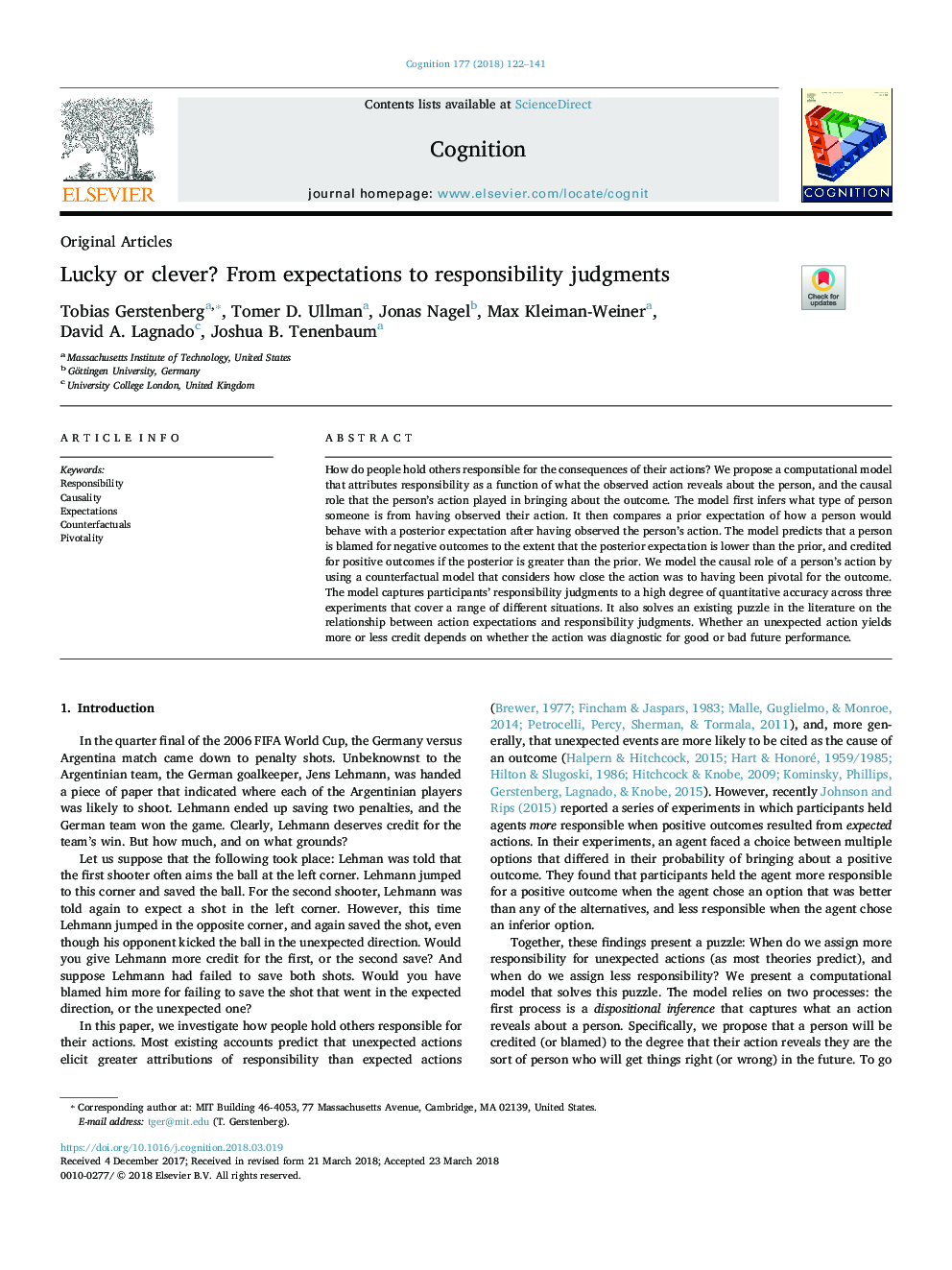| کد مقاله | کد نشریه | سال انتشار | مقاله انگلیسی | نسخه تمام متن |
|---|---|---|---|---|
| 7285283 | 1474090 | 2018 | 20 صفحه PDF | دانلود رایگان |
عنوان انگلیسی مقاله ISI
Lucky or clever? From expectations to responsibility judgments
ترجمه فارسی عنوان
خوش شانس یا هوشمندانه از انتظارات به قضاوت مسئولیت
دانلود مقاله + سفارش ترجمه
دانلود مقاله ISI انگلیسی
رایگان برای ایرانیان
کلمات کلیدی
مسئولیت، علیت، انتظارات، مخالفان، محوری
ترجمه چکیده
چگونه افراد دیگر مسئولیت عواقب اقدامات خود را بر عهده دارند؟ ما یک مدل محاسباتی ارائه می دهیم که مسئولیت را به عنوان عملکردی از آنچه که مشاهده می شود بر روی شخص نشان می دهد و نقش علیت ایفا می کند که عمل فرد در نتیجه نتیجه گیری را نشان می دهد. ابتدا مدل ابتدا مشخص می کند چه کسی شخص را از مشاهده عمل خود می داند. پس از آن، انتظارات پیشین چگونگی رفتار فردی با انتظارات خلفی را پس از مشاهده اقدام فرد مقایسه می کند. مدل پیش بینی می کند که یک فرد برای نتایج منفی متهم به اندازه ای است که انتظارات خلفی کمتر از قبل است و برای نتایج مثبت در صورتی که خلفی بیشتر از قبل باشد، اعتبار داده شود. ما نقش علیت یک عمل شخص را با استفاده از یک مدل غلط املایی که در نظر نزدیک بودن اقدام به اهمیت نتایج است، مدل سازی می کنیم. این مدل تصدیق مسئولیت مسئولیت شرکت را به درجه بالایی از دقت کمی در سه آزمایش انجام می دهد که طیف وسیعی از شرایط مختلف را پوشش می دهد. همچنین پازل موجود در ادبیات مربوط به رابطه بین انتظارات عمل و قضاوت مسئولیت را حل می کند. این که آیا اقدام غیرمنتظره اعتبارات بیشتر یا کمتر را انجام می دهد بستگی به این دارد که آیا عملکرد تشخیصی برای عملکرد خوب یا بد آینده است یا خیر.
موضوعات مرتبط
علوم زیستی و بیوفناوری
علم عصب شناسی
علوم اعصاب شناختی
چکیده انگلیسی
How do people hold others responsible for the consequences of their actions? We propose a computational model that attributes responsibility as a function of what the observed action reveals about the person, and the causal role that the person's action played in bringing about the outcome. The model first infers what type of person someone is from having observed their action. It then compares a prior expectation of how a person would behave with a posterior expectation after having observed the person's action. The model predicts that a person is blamed for negative outcomes to the extent that the posterior expectation is lower than the prior, and credited for positive outcomes if the posterior is greater than the prior. We model the causal role of a person's action by using a counterfactual model that considers how close the action was to having been pivotal for the outcome. The model captures participants' responsibility judgments to a high degree of quantitative accuracy across three experiments that cover a range of different situations. It also solves an existing puzzle in the literature on the relationship between action expectations and responsibility judgments. Whether an unexpected action yields more or less credit depends on whether the action was diagnostic for good or bad future performance.
ناشر
Database: Elsevier - ScienceDirect (ساینس دایرکت)
Journal: Cognition - Volume 177, August 2018, Pages 122-141
Journal: Cognition - Volume 177, August 2018, Pages 122-141
نویسندگان
Tobias Gerstenberg, Tomer D. Ullman, Jonas Nagel, Max Kleiman-Weiner, David A. Lagnado, Joshua B. Tenenbaum,
